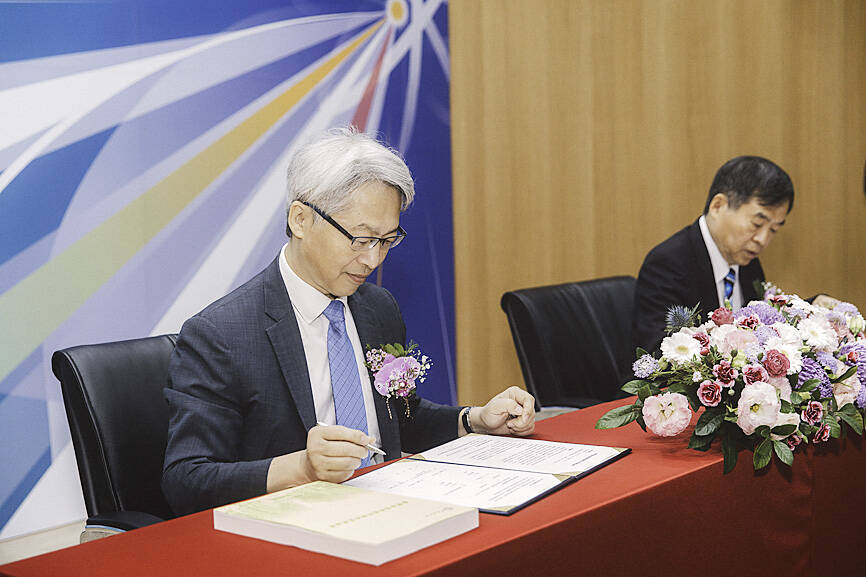Academia Sinica and CSBC Corp, Taiwan yesterday signed a memorandum of understanding for cooperation on marine energy technology development.
Academia Sinica is developing and manufacturing a 100 kilowatt (kW) ocean current turbine generator that it expects to test in waters off Taitung County later this year, Taiwan’s top research institution said.
The combination of its research capabilities and CSBC’s maritime engineering strengths would hopefully accelerate the testing and deployment process to capture the energy from the Kuroshio Current, which flows off Taitung County all year round, it added.

Photo courtesy of Academia Sinica
The current is the world’s second-largest ocean current, with a strong and stable flow that offers potential for generating energy, Academia Sinica president James Liao (廖俊智) said, adding that ocean currents can generate electricity throughout the year without fuel or emitting greenhouse gases and pollutants, and therefore have the potential to serve as a form of baseload power.
Taiwan has talked about exploring marine energy for many years, but progress has been halted due to difficulties in site selection, maritime engineering, turbine generator installation and cable transmission technologies, he said.
A site has finally been found off the coast of Chenggong Township (成功) in Taitung, and the institution has developed a 100kW current turbine generator with corrosion and pressure resistance characteristics equal to a submarine, Liao said.
As the largest shipbuilding company in Taiwan, CSBC is expected to contribute to the marine energy project through its skill in vessel building, maintenance and support for offshore wind power and related technologies, he added.
The company has engaged in green energy research and development, including the designing of oceanographic research vessels, environmentally friendly ships, smart energy and carbon reduction technologies, and energy storage systems, CSBC chairman Cheng Wen-lon (鄭文隆) said.

An undersea cable to Penghu County has been severed, the Ministry of Digital Affairs said today, with a Chinese-funded ship suspected of being responsible. It comes just a month after a Chinese ship was suspected of severing an undersea cable north of Keelung Harbor. The National Communications and Cyber Security Center received a report at 3:03am today from Chunghwa Telecom that the No. 3 cable from Taiwan to Penghu was severed 14.7km off the coast of Tainan, the Ministry of Digital Affairs said. The Coast Guard Administration (CGA) upon receiving a report from Chunghwa Telecom began to monitor the Togolese-flagged Hong Tai (宏泰)

A cat named Mikan (蜜柑) has brought in revenue of more than NT$10 million (US$305,390) for the Kaohsiung MRT last year. Mikan, born on April 4, 2020, was a stray cat before being adopted by personnel of Kaohsiung MRT’s Ciaotou Sugar Refinery Station. Mikan was named after a Japanese term for mandarin orange due to his color and because he looks like an orange when curled up. He was named “station master” of Ciaotou Sugar Refinery Station in September 2020, and has since become famous. With Kaohsiung MRT’s branding, along with the release of a set of cultural and creative products, station master Mikan

RISING TOURISM: A survey showed that tourist visits increased by 35 percent last year, while newly created attractions contributed almost half of the growth Changhua County’s Lukang Old Street (鹿港老街) and its surrounding historical area clinched first place among Taiwan’s most successful tourist attractions last year, while no location in eastern Taiwan achieved a spot in the top 20 list, the Tourism Administration said. The listing was created by the Tourism Administration’s Forward-looking Tourism Policy Research office. Last year, the Lukang Old Street and its surrounding area had 17.3 million visitors, more than the 16 million visitors for the Wenhua Road Night Market (文化路夜市) in Chiayi City and 14.5 million visitors at Tainan’s Anping (安平) historical area, it said. The Taipei 101 skyscraper and its environs —

Taiwan on Friday said a New Zealand hamburger restaurant has apologized for a racist remark to a Taiwanese customer after reports that it had first apologized to China sparked outrage in Taiwan. An image posted on Threads by a Taiwanese who ate at Fergburger in Queenstown showed that their receipt dated Sunday last week included the words “Ching Chang,” a racial slur. The Chinese Consulate-General in Christchurch in a statement on Thursday said it had received and accepted an apology from the restaurant over the incident. The comment triggered an online furor among Taiwanese who saw it as an insult to the